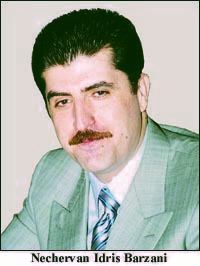 |
| Vol. 4 No. 10 | Table of Contents MEIB Main Page | October 2002 |
| | Interview: Nechervan Idris Barzani Prime Minister of the Kurdistan Regional Government in Irbil (KDP) |
 |
| "A fledgling democracy has taken root in Iraqi Kurdistan that has the potential to serve as a model for a future Iraq." |
| "Extremism does not flourish where democracy and freedom prevail, but grows under the shadow of dictatorship." |